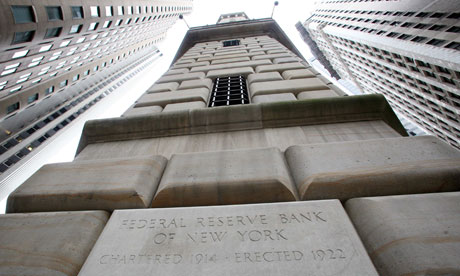
What should we make of the latest moves to kickstart the US economy, and to save the euro? As the late, great Harvard chaplain Peter Gomes said to my graduating class many years ago, about our degrees: "There is less there than meets the eye."
Quantitative easing, the third tranche of which was announced in the US last week (QE3), is just a fancy phrase for buying bonds, notably mortgage-backed-securities, in which operation the Federal Reserve takes assets from the banks and gives them cash. This raises the bond price and lowers the yield. It also tends to boost stock prices – very nice for people who own stock – and it can spur mortgage refinancing, improving the cashflow of solvent homeowners.
And the effect on the economy of all this is? Mostly indirect and quite small. People don't generally spend capital gains as windfalls. Saving on mortgage debt helps to support spending but some of it goes to paying down other debts. People who are already underwater on their mortgages can't refinance anyway, and are not affected. Yes, there is some effect. But powerful stimulus, this is not.
Meanwhile, the European Central Bank is buying the dregs of the European bond market, propping up their price. The operation is similar to QE but the help for the economy is even less. Mario Draghi, the bank chief, aims to save the euro, not the eurozone; his conditions actually prevent beneficiaries from using the money they save; in fact, to get the aid they must spend less. So long as this goes on, unemployment, budget deficits and debt will get worse. It's no surprise that sensible countries refuse the deal for as long as they can.
Some people in high places – Tim Geithner, the US treasury secretary, for example – profess that restarting bank lending is the key to economic recovery, and increasing bank reserves will spur them to lend. (What else are banks really good for?) But if anyone believes that reserves are key to lending, they deeply misunderstand what banks do.
As Hyman Minsky used to say: banks are not moneylenders! Banks don't lend reserves, and they don't need reserves in order to lend. Banks create money by lending. They need a client willing to borrow, a project worth lending to, and collateral to protect against risk. If these are lacking, no amount of reserves will turn the trick. And especially not when the government is willing to pay interest on their reserves: the truest form of welfare, income for doing nothing.
In a debt-deflation, actually there's even worse news. When asset prices are falling, how do banks make money? Not by fighting the trend but by riding it. If they withhold loans, prices will fall even further, and the assets can be bought later for even less. You might call this shorting the entire economic system. You can't blame the banks for this, it's how money makes money in hard times. But to expect them to act as the agents of economic growth in such conditions is foolish.
Among the deluded in this matter are Republican members of Congress who rushed to attack QE3 for overstimulating, and urge laws constraining the Federal Reserve to a single price stability objective, in the manner of the European Central Bank. Obviously if the policy won't work – and it won't – they have nothing to fear on inflation. But the move toward a "price stability only" mandate for the Fed would have an effect that you might think legislators would disfavour: it would destroy the honest accountability of the central bank to Congress.
The Fed today operates under what is called a "dual mandate" – full employment and price stability. The law, originally known as the Humphrey-Hawkins Full Employment and Balanced Growth Act of 1978, is one for which I drafted the monetary sections, as the responsible staff member of the House Banking Committee, around 1976. It actually states a range of economic objectives and was deliberately kept general; the purpose was not to dictate economic theory but to foster an honest dialogue between the Fed and Congress over what monetary policy is and does. This framework for accountability has been remarkably durable – the hearings we started have held up as the basic method of monetary policy oversight for 34 years.
Changing to a price-stability objective would oblige Ben Bernanke, the Fed chairman, to claim, as ECB officials do, that he is motivated solely by his charter, even if obviously doing something else. And Congress, having imposed the price-stability straitjacket, would not be able to complain about unemployment, foreclosures or anything else. The Fed-Congress dialogue would be reduced to a tissue of ritual incantation and lies.
What we need instead, today, is a candid review of what central banks cannot do. Yes, they can usually forestall panic. Yes, for better or worse they can keep zombie banks alive. No, they cannot bring on economic recovery or solve any of our deeper economic problems, from unemployment and foreclosures in America to unemployment and economic collapse in Greece and elsewhere. The sooner we stop thinking of central bankers as wizards and magicians, the better.
Source: Guardian - Quantitative easing isn't magic
No comments:
Post a Comment